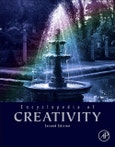Table of Contents
ActingAdaptation and CreativityAdvertisingAestheticsAgingAltered and Transitional StatesAnalogiesArchitecture, Modern WesternArt and AestheticsArt, Artists And Arts audiencesAssociative TheoryAsynchronicityAttentionAttitudesAttribution and CreativityAurobindo, SriAwardsBarriers to CreativityBeatlesBeethoven, LudwigBehavioral Approaches to CreativityBell, Alexander Graham*Bipolar DisorderBirth OrderBohm, DavidBrain and NeuropsychologyBronte Sisters*Business/ ManagementCassatt, MaryChaos Theory and CreativityCarroll, Lewis*Cezanne, Paul*Chaplin, CharlieChild, JuliaClaudel, CamilleCognitive Style and CreativityCollaborationComponential ModelsComputers and CreativityConcepts of Creativity: A historyConformity and ConventionalityConfusiousismConsensual AssessmentContrarianismCreative ClimateCreative Environments, Conditions, and SettingsCreative Products Creativity ComplexCreativity through HistoryCrime and CreativityCritical ThinkingCross-Cultural DifferencesCurie, Marie Sklodowska*Dance and CreativityDark Side of CreativityDarwin, Charles Robert*DaVinci, Leonardo*Definitions of CreativityDesignDevelopmental Trends in Creative Abilities and PotentialsDevianceDialectical Thinking: Implications for Creative ThinkingDineson, Isak*DiscoveryDistribution of CreativityDivergent ThinkingDiversity,CulturalDomains of CreativityDreams and CreativityEast vs. WestEccentricityEconomic Perspectives on CreativityEducationEinstein, Albert*EminenceEmotion/AffectEnhancement of CreativityEntrepreneurEveryday CreativityEvolving Systems ApproachExercisesExpertiseExpressive Arts TheoryFamilies and CreativityFilmFitzgerald, EllaFlow and Optimal ExperienceFood, Creativity of Recipes, Pairings, MenusFreud, Sigmund*Friendship and CreativityGandhi, MahatmaGender DifferencesGeneticsGenius and GreatnessGiftedness and CreativityGroup DynamicsHadyn, JosephHandwriting and CreativityHepburn, KatharineHeuristicsHistoriometryHopper, Grace MurrayHumorImaginationImplicit TheoriesImprovisationIncubationInnovation InsightIntelligence (relation to creativity)Interest InventoriesIntuitionInvention Janusian, Homospatial and Sepconic Articulation ProcessesJoyce, JamesJungian TheoryKahlo, FridaKnowledgeKrebs, Hans Adolf*Kurosawa, AkiraLeadershipLife StagesLogic and ReasoningLongitudinal StudiesMad Genius ControversyMatthew, Pygmalion, and Founder EffectsMead, MargaretMemory & CreativityMental Health: Affective DisordersMentorsMetacognitionMetaphorsMichelangeloMindfulnessMonet, ClaudeMoral Issues in CreativityMotivationMultiple DiscoveryMultiple IntelligencesMusicNature/Nurture and CreativityNetworkingNoveltyO'Keefe, Georgia*Organisational DevelopmentOrganizational culture OverexcitabilitiesParadigm ShiftsPerception and CreativityPersonal CreativityPersonality: Autonomy and Independence PerspectivesPessoa, Fernando*Piaget, Jean*PicassoPlath, Sylvia*Play (Creative processes in)PoetryProblem FindingProblem SolvingProdigiesPrograms and Courses in CreativityPsycholinguisticsRank, Otto Remote AssociatesResearch MethodsResearch: QualitativeResearch: QuantitativeRewardsRisk-takingSchizophrenia and PsychosisSchumann, ClaraSchumann, Robert*Science (Creativity In)Self-ActualizationSerendipitySexton, Anne*Shakespeare, William*Shaw, George Bernard* Social PsychologySociobiologySocio-Economic StatusSpiritualitySports and CreativitySteiglitz, AlfredStress and CreativitySubstance Abuse and CreativitySuicideSynaesthesiaSynchronicitySystems ApproachTactics and Strategies for CreativityTagore, Rabindranath*Talent and CreativityTeaching CreativityTeamsTeasdale, SaraTesting/Measurement/AssessmentThe Creative Sector and Class of SocietyThe Four Ps of Creativity: Person, Product, Process, and PressTheatre Theories of CreativityTherapy and Counselling (Creative Processes In)TimeToulouse-Latrec, Henri de*TrainingTrajectoriesTransforming Illness and Visual ArtUnconsciousUnderacheivement van Gogh, Vincent*Vygotsky, Lev Semenovich*War Wertheimer, MaxWomen and CreativityWoolf, Virginia*Wordsworth, William*Wright, Wilbur and Orville*Writing and CreativityZeitgeistZen*Denotes online-only article
Authors
Runco, Mark A. Mark Runco, Director of Creativity Research & Programming, Southern Oregon University, Ashland OR, USAMark Runco earned his Ph.D. in cognitive psychology from the Claremont Graduate School in California and has studied creativity ever since. He is currently a Director of Creativity Research & Programming, Southern Oregon University, Ashland OR, USA He began his teaching career as an assistant professor of psychology at the University of Hawaii, Hilo. He then taught at Cal State Fullerton for 22 years. He was also an adjunct professor at the Norwegian School of Economics and Business Administration for nearly 15 years and lectured regularly at Universidad de Cantabria in Spain and Shaanxi Normal University in Xi'an, China. He is a distinguished consulting faculty member at the Saybrook Graduate University in San Francisco and remains on the University of Georgia Graduate Faculty
Mark developed nine seminars on creativity, including "Creativity: What It Is and What It Is Not," "The Assessment of Creativity," "Creative Cognition," and "Social Contexts for Creativity." He is Fellow and past president of Division 10 (Psychology, Art, Creativity, and Aesthetics) of the American Psychological Association.
Mark also founded the Creativity Research Journal, which he still edits, along with two new journals: Business Creativity and the Creative Economy, and the Journal of Genius and Eminence. In 2010, Mark published the "rCAB" (Runco Creativity Assessment Battery), a comprehensive battery of tests for the assessment of creativity. He has published over 300 articles, chapters, and books on creativity, its measurement and enhancement. His textbook Creativity: Theories and Themes: Research, Development, and Practice has been translated into 10 languages. The 3rd edition will be published in 2020. He also was an Editor-in-Chief of the Encyclopedia of Creativity, which was published in 1999 and the second edition, which was published in 2011.








